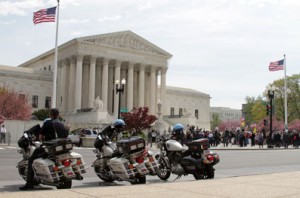By: KQED News Staff and Wires

The Supreme Court signaled Wednesday that it could throw out other key parts of the Affordable Care Act if it first finds the individual insurance requirement unconstitutional.
On the third and last day of arguments, the justices appeared to accept the administration's argument that at least two important insurance changes are so closely tied to the insurance requirement that they could not survive without it. Those two changes are the popular provisions that both require insurers to offer insurance to applicants with pre-existing conditions and also requires insurers to charge the same rates to people who are roughly the same age, regardless of their health.
Those changes should go, the Obama Administration argued, because without the individual mandate, people might wait until they're sick before they signed up for coverage. Not enough people would be in the health insurance pool to spread risk. Ruin could come to the insurance market.
In short the Court faces three scenarios if it strikes down the individual mandate:
- Is the mandate "severable" from the rest of the ACA--can the Court strike down the mandate while upholding the rest of the law?
- If the mandate is stricken, should the two other changes to health insurers be struck down with it, leaving the rest of the health care law to stand?
- Is the mandate such an integral part of the overhaul that the entire law should be cast aside?
Those in the Courtroom describe the justices as wary of overturning the entire law, but torn on how, exactly, they could pick and choose which parts of the law would fall should they strike the mandate.
SCOTUSBlog’s mid-argument update, from Kevin Russell, finds hints of concern from liberal justices that the mandate could fall:
"... The Court was skeptical that the whole act should fall if the individual mandate is invalid. But there wasn’t any clear indication of how far the Court would go. It seemed like there wasn’t much question, except from Justice Sotomayor that the community rating and mandatory issue provisions would fail, that is the government’s position. The fact that the liberals were very engaged, particularly Justice Kagan, may show that they are very worried that the mandate is going to be held unconstitutional."
The Associated Press reported that Paul Clement, the lawyer for the states arguing to overturn the health care law as a whole, said the court would leave a "hollow shell" if it turned aside the individual mandate and the two other insurance provisions. "The rest of the law cannot stand," he insisted.